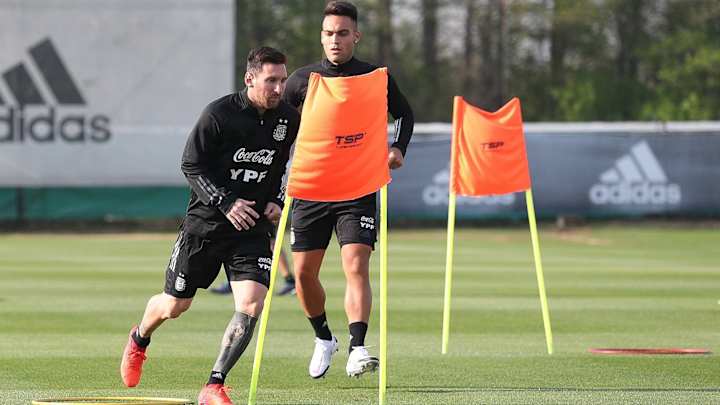CONMEBOL Forges Ahead With World Cup Qualifying, Pandemic Be Damned

There's no bigger war of attrition in World Cup qualifying than that in South America. CONMEBOL's qualifying gauntlet is regularly the most fierce and intense in the world, with the four automatic berths currently allotted to the confederation–and the one place in an intercontinental playoff for a potential fifth–truly earned by those who secure them.
That war of attrition, which features all 10 of the region's teams facing each other home and away in a single-table format, has its greatest wrinkle yet: a global pandemic. Whereas the Asian Confederation, CONCACAF, Oceania, African confederation and UEFA won't begin their final rounds of World Cup qualifying until next year as a result of pandemic-induced delays, South America is forging right ahead, beginning with Thursday and Friday night's opening matchday.
CONMEBOL has had its share of delays, too. It was supposed to begin its 18-round marathon in March, prior to Copa America, but both were postponed due to the coronavirus. Whether it's a sound decision to start qualifying now—and whether the proper safeguards are in place—will become clear in due time.
The pandemic has wreaked havoc in South America, just as it has in most places across the world, touching the footballing universe as well. Reigning Brazilian and South American club champion Flamengo, for instance, had 16 players test positive late last month.
The fact that so much international travel is involved for these squads to gather and that so many players for these national teams hail from clubs abroad—where there have been varying degrees of infection from club to club—adds multiple new layers of potential complications, dangers and risks.
¡A 1⃣ día del inicio de las #EliminatoriasSudamericanas, las más emocionantes del mundo!
— CONMEBOL.com (@CONMEBOL) October 7, 2020
🇦🇷🇧🇴🇧🇷🇨🇴🇨🇱🇪🇨🇵🇾🇵🇪🇺🇾🇻🇪
▸https://t.co/81AA5AGrtJ pic.twitter.com/TE8VJFur7w
In normal circumstances, clubs cannot deny national teams the services of their players during FIFA international windows, but today's circumstances are anything but normal. FIFA acknowledged that recently, allowing for some wiggle room given the varying local and league protocols necessitating players to quarantine upon returning to their clubs. According to the Associated Press, CONMEBOL "convinced most local authorities to lift quarantine measures for incoming players," but that isn't the same on the return end. As it relates to MLS, not all players called upon by their national teams were granted their release. With some local jurisdictions compelling returning players to self-quarantine for longer than five days (and thus miss a significant number of matches), teams in those areas were given leeway to deny call-ups. Not all were, though, and they'll pay the price. Mexico's Rodolfo Pizarro will wind up missing three weeks of time between travel and abiding by MLS's quarantine guidelines—covering five matches—for Inter Miami all to play in a pair of friendlies, for instance.
Already, teams around the world have found the sledding to be less than smooth. All one needs to do is look at the issues European national teams are currently experiencing upon testing players in camp. Liverpool's Xherdan Shaqiri tested positive in Switzerland camp, while three Scotland players have been ruled out for their Euro 2020 (2021*) qualifying playoffs after one tested positive and two others were classed as "close contacts" and have gone into isolation and quarantine. Ukraine has had to call its 45-year-old goalkeeping coach, who retired from playing eight years ago, into active duty on account of its top two goalkeepers testing positive before Wednesday's friendly vs. France.
To think that South American players would be immune to similar results is naive. Chile's Mauricio Isla, for instance, tested positive on Tuesday, its federation announced. Colombia starting goalkeeper David Ospina will miss out on his nation's opening matches against Venezuela and Chile after two of his Napoli teammates tested positive, which has forced him to self-quarantine. Three of his countrymen are in a similar situation and cannot travel, either. There's no escaping the extended web of the pandemic.
Regardless, South America's show will go on, with teams returning to action for the first time since Nov. 2019. The first set of matches will be played without fans, removing one core element of these intense matches, yet some constants remain. Lionel Messi (Argentina) and Neymar (Brazil) will lead their respective nations on the long and arduous road to Qatar 2022, each seeking the crown jewel of the World Cup trophy to cement their legacies in their home countries. James Rodriguez, rejuvenated after a strong start to life at Everton, will guide Colombia. Luis Suarez, fresh off his move to Atletico Madrid, will lead the line for Uruguay, though Edinson Cavani, who just signed with Manchester United, was not called in.
There are the usual methods at analyzing and breaking down matchups in the entertaining cauldron that is CONMEBOL World Cup qualifying, but everything comes with the coronavirus caveat. The winners of South America's war of attrition may very well be the ones that manage to successfully steer clear of virus-related setbacks along the way.

Avi Creditor is a senior editor and has covered soccer for more than a decade. He’s also a scrappy left back.